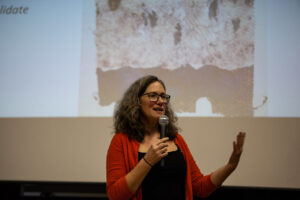
- This event has ended.
Jennifer Robinson, Professor and Chair of Human Geography at University
College London, will deliver the annual Wallace W. Atwood Lecture.
Wallace W. Atwood Lecture.
Dimensions of Urban Development Politics: Transcalarity, Circuits, Territories
This paper offers an analytical trio of concepts to chart the dimensions of urban development politics starting from an African context but relevant to, and in conversation with, experiences on other continents. Analyses of the politics of urban development have not benefitted from the experiences of African urban settings. Characterised by relatively weakly resourced municipalities, informality of planning and the state and highly transnationalised forms of governance alongside oscillation between political decentralisation/centralisation and financial devolution/concentration of resources, African experiences may seem to stand out as profoundly different from those which have informed classical theorisations of urban development politics. And yet, it is across the African continent that much of the world’s future urban areas are being made. With the rise of global urban studies there are strong grounds for theorising urban development politics starting from the diversity of experiences across the African continent. Evidence from current research and long-term observations in three African urban contexts (Lilongwe, Accra and Dar es Salaam) indicate the need for revising inherited conceptualisations. A US-based model speaks to the alignment of locally dependent interests of rooted capitals, municipal governments with strongly territorialised revenue streams, and an electorate concerned with locality and jobs, all looking to circulating capitals to secure investment. A political economy model focusses on the circulation of finance, policies and practices aligned with powerful international capitalist interests, including neoliberalisation and financialisation. These models vastly overestimate the resources and agency of municipal government in many urban contexts, omit the enhanced institutional interests of national actors in urban development, and assume the external nature of what are often embedded and emergent “circulating” processes and actors. The range of international actors considered has also been analytically restricted or mischaracterised, as sovereign and developmental actors play a powerful role in many cities and significant private sector interests may not be very international.
Three dimensions of urban development politics, starting in African urban contexts, are proposed. Transcalarity, rather than local dependence, characterises much urban development, driven by emergent coalitions involving close alignments of national governments and international actors to realise ambitious projects often tenuously connected to the spatial fabric or socio-economic needs of urban areas. These may actively side-line local governments. Extending regime theory beyond localist formations, agency and power relations are emergent, determined beyond institutional procedures and not aligned with geographical scales. Circuits, characterised by territorially emergent formations of interests and programmes, rather than circulations of pre-determined policies or interests, highlight the long-term embeddedness of “international” actors in countries and urban areas, as embassies, representatives of bi-lateral and multi-lateral aid agencies, and private firms (or state-owned enterprises) foster investment and financing decisions through close ties cultivated across municipal, national and regional institutions. Finally, with the emergence of sprawling urbanised regions and urbanised territories in far-flung and dispersed contexts, the grounds of urban politics need to encompass the actual territories of urbanisation, rather than administratively delimited municipalities, metropolitan governments or city-regions: (any) urbanised territory provides a starting point for attending to a politics of urban development.
This paper draws on ongoing research and analysis by the research team of the ERC funded project, Making Africa Urban: Phil Harrison, George Owusu, Evance Mwathunga, Matt Lane, Sylvia Croese, Rosina Essien, Wilbard Kombe and Yan Yang.
I am a Professor of Human Geography at University College London and co-Director of UCL Urban Laboratory. Previously I have worked at the University of KwaZulu-Natal, the LSE and the Open University. My book, Ordinary Cities (Routledge, 2006) developed a post-colonial critique of urban studies. My new book, Comparative Urbanism: Tactics for Global Urban Studies (Wiley-Blackwell, 2022), proposes new methodological foundations for urban studies, which are further developed in the Routledge Handbook of Comparative Global Urban Studies, co-edited with Patrick Le Galès. Earlier empirical research explored the history of apartheid cities, and the politics of post-apartheid city-visioning. Current empirical projects focus on the politics of large-scale urban developments (London, Johannesburg, Shanghai) and the transnational circuits shaping African urbanisation (Accra, Dar es Salaam, Lilongwe).

